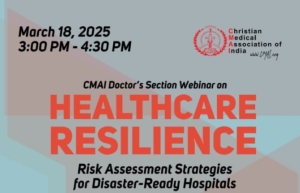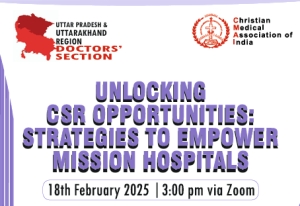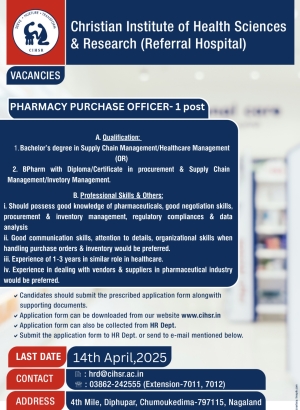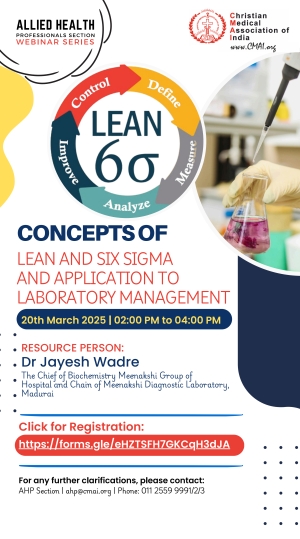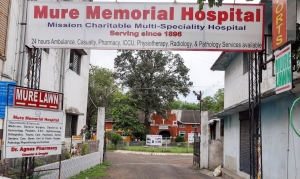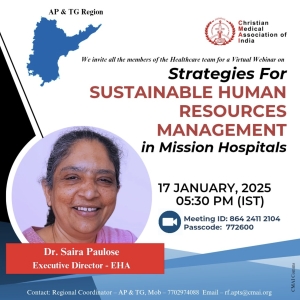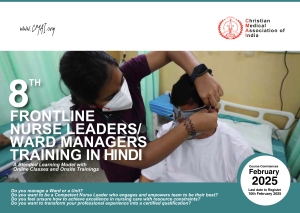Administrators' e-Magazine
Site Manager
Wednesday, 02 April 2025 10:24
HEALTHCARE RESILIENCE WEBINAR SYNOPSIS
The CMAI Doctors Section hosted a webinar titled "Healthcare Resilience: Risk Assessment Strategies for Disaster-Ready Hospitals" on March 18, 2025, as the first in a series on disaster management. The 90-minute session featured four experts who addressed various aspects of disaster preparedness and risk assessment for healthcare facilities. Dr Abhijeet Sangma moderated the event, which began with an opening prayer by Dr Rajiv Joy Nathan, chairperson of the CMAI Doctors Section.
YouTube link to the Webinar recording: https://www.youtube.com/watch?v=x7mmH4Xj6i4&pp=ygUMY21haSB3ZWJpbmFy
SPEAKER PRESENTATIONS
Mr Peniel Malakar (Health & Humanitarian Consultant, Founder of Kriti): Mr Malakar emphasised the critical need for assessing disaster risks in healthcare facilities. He highlighted that no place on earth is safe from disasters, presenting examples of hospitals affected by floods, storms, and fires across India. He stressed that "failing to prepare is preparing to fail" and that while disasters cannot be prevented, their impact can be mitigated through proper risk assessment. Mr Malakar explained that risk assessment should be comprehensive, identifying both internal and external risks, and should prioritise departments and actions based on urgency and available resources. He concluded that the cost of recovery is much higher than the cost of prevention, making risk assessment the first critical step in hospital disaster preparedness.
1. Mr Peniel - Healthcare Resilience.pptx
Dr Neeraj George Paul (Emergency Department Quality Manager, CMC Vellore): Dr Neeraj focused on ensuring continuity of emergency services during disasters. He shared real-world examples of hospital emergencies including oxygen shortages, fires, and floods that disrupted critical care. He presented a structured approach to risk assessment in emergency units, explaining how to identify, evaluate, and prioritize risks through incident reporting, staff feedback, simulation drills, and patient outcome tracking. Dr Neeraj demonstrated CMC Vellore's risk matrix methodology that evaluates both probability and impact of risks to generate a risk score. He emphasized the importance of preparing for patient surges, addressing environmental risks like fire safety, and ensuring emergency exits are functional and accessible. He shared CMC's experience with mass casualty incidents and how they identified gaps in their response capabilities.
2. Mr Neeraj - Risk Assessment.pptx
Dr Pretesh R Kiran (Disaster Management Unit Convenor, St. John's Academy): Dr Pretesh addressed climate change impacts on healthcare infrastructure. He presented data showing India as highly vulnerable to natural disasters, with an average of eight major calamities annually. He detailed how extreme heat waves, monsoon flooding, cyclones, droughts, air pollution, and landslides specifically affect healthcare facilities through infrastructure damage, power outages, water scarcity, and access disruptions. Dr Pretesh highlighted unique vulnerabilities in Indian healthcare facilities, including limited backup power, aging infrastructure, inadequate building codes, and facilities located in high-risk areas. He emphasised the need for climate-resilient healthcare facilities that can withstand and adapt to changing environmental conditions, using Bangalore as a case study of increasing temperatures, water scarcity, and urban flooding.
3. Dr Pretesh - Climate Risks.pptx
Mr David Dungan (Founder of Readify, LLC): Mr Dungan compared international risk assessment tools and frameworks for healthcare facilities. He reviewed four major assessment tools: FEMA's Threat Hazard Identification and Risk Assessment (THIRA), WHO's Strategic Tool for Assessing Risk (STAR), Kaiser Permanente's Hazard Vulnerability Analysis (HVA), and WHO's Hospital Safety Index (HSI). He explained the strengths and limitations of each tool, noting that many lack objective impact measurement or are not specifically designed for healthcare settings. Mr Dungan then introduced RetifyRM, a Microsoft SharePoint-based risk management application that incorporates elements from these established frameworks while addressing their limitations. The tool provides structured assessment of organisational capabilities, objective impact analysis, and automated mitigation planning and tracking.
4. Mr David - Practical Risk Analysis tools.pptx
PANEL DISCUSSION HIGHLIGHTS. The panel addressed several key questions:
1. Minimum risk assessment for small facilities with limited resources. Mr. Malakar emphasised the need for comprehensive assessment but phased implementation, prioritizing areas of immediate threat where action is feasible.
2. Prioritising emergency services during disasters. Dr Neeraj explained how triage criteria were modified during COVID-19, emphasizing that ICU patients, those requiring oxygen, and dialysis patients should receive priority. He stressed the importance of identifying surge capacity and implementing appropriate protocols.
3. Climate change impacts on Indian hospitals. Dr Pretesh noted that impacts vary by region—heat and pollution in North India, flooding in coastal and southern regions, and urban flooding in metropolitan areas. He emphasized the need for location-specific planning.
4. Risk assessment tools for South Asian context. Mr. Dungan recommended tools that clearly and objectively assess capabilities and vulnerabilities while being simple to use and understand. He stressed the importance of prioritization and integrating assessment with the organization's broader risk management framework.
5. Single most important step for hospital administrators. The panelists emphasized: fostering a culture of safety (Mr David), accepting vulnerability and preparing accordingly (Dr Neeraj), developing and testing preparedness plans (Dr Pretesh), and conducting regular drills and physical verification of safety measures (Mr Peniel).
The panel also discussed ISO certification challenges, noting that certificates alone don't ensure safety without proper implementation and a culture of safety. They emphasised learning from past disasters, avoiding repeated mistakes, and the importance of honest incident reporting without fear of repercussions.
The webinar concluded with key takeaways: risk assessment is an ongoing process requiring regular updates; continuity planning must prioritize both critical services and staff well-being; climate change considerations should be integrated into all disaster planning; and implementation requires customization to each facility's specific context. The moderator announced that future webinars in the series would focus on risk management implementation and other aspects of disaster preparedness.
Published in Workshops
Tagged under
Wednesday, 02 April 2025 10:10
Unlocking CSR Opportunities - Strategies to Empower Mission Hospitals
Webinar Synopsis: | 18th Feb 2025
The host and the moderator of the event Dr Abhijeet Sangma, Secretary of Doctors Section opened the webinar by welcoming participants and emphasising the critical importance of CSR funding for mission hospitals in today's challenging healthcare landscape. It was highlighted how mission hospitals face increasing pressure to maintain quality healthcare while ensuring charity and financial sustainability. The host noted that CSR funding represents a significant opportunity to upgrade medical infrastructure, expand services, implement innovative solutions, and reach more underserved communities. He emphasised that the webinar would provide practical insights from both funding agency and implementing agency perspectives, offering strategic approaches to develop CSR proposals and build lasting corporate partnerships. The session was opened with a prayer by Mr Sumit David, followed by introductions of the distinguished speakers.
Speaker Profiles
Brig Rajiv Williams
- Postgraduate in International Relations from Madras University
- Served 33 years in the military, including nearly two decades in Jammu and Kashmir
- Former Group Head of CSR and Sustainability at Jindal Steel (17 years)
- Represented Indian CSR fraternity at global platforms including the United Nations
- Convener of the UNGC Human Rights Committee
- Author of several books including "The Long Road to Siachen" and "Valor and Values: Aligning Military Experience to CSR"
- Recipient of numerous awards including Asia Pacific Leadership Award and recognition among the top 100 most impactful global CSR Leaders
Mr Amit Kumar
- Head of Fundraising at The Leprosy Mission (TLM) India
- Over 26 years of experience in resource mobilization and communication strategy
- Expertise in fundraising, partnership establishment, development marketing, and internet marketing
- Previous experience with media houses and NGOs including Plan International and SOS Children's Villages International
- Successfully mobilized resources from public sector undertakings, corporates, funding foundations, and high-net-worth individuals
- Implemented integrated fund development mechanisms across India and several Asian countries
First Presentation: Corporate Perspective: Brig Rajiv Williams, a CSR consultant and former CSR head of Jindal Steel, shared insights from the corporate perspective:
· The CSR landscape has evolved significantly with the mandatory 2% investment requirement
· Corporates prioritize projects based on geography, with preference for areas near their operations
· Outcome-driven approach is essential - corporates look at beneficiary numbers and tangible results
· Religious identity should be downplayed when approaching corporates for funding
· Project proposals should include baseline surveys, needs assessment, and clear timelines
· Partnerships are critical - with corporates, government agencies, and other stakeholders
· Healthcare remains a top priority area for CSR funding
· Medium and small-scale industries also have CSR requirements and can be approached
Key recommendations:
· Align with corporate CSR strategies and government priorities
· Focus on specific geographies relevant to the corporate
· Develop clear, concise proposals with measurable outcomes
· Consider innovative healthcare approaches beyond traditional services
Second Presentation: Civil Society Perspective: Mr Amit Kumar, head of fundraising at TLM India, shared practical insights from an implementing agency's perspective:
· India's CSR outlay exceeds 35,000 crores, with health and education as top priority areas
· Two funding approaches: restricted (CSR, institutional) and unrestricted (individuals, HNIs)
· Product development is crucial - corporates won't fund general operations but will support specific "products"
· A dedicated fundraising team is essential, even if starting with just one person
· Communication strategy should highlight the cause first, organization second
· Online reputation management is critical - negative information can impact funding decisions
· Religious identity should be kept in the background when approaching corporates
The "Ten Commandments" for CSR funding:
· Appoint dedicated fundraising personnel
· Ensure strong compliance documentation
· Develop clear, focused products
· Find your niche areas
· Create a professional website
· Highlight your strengths
· Maintain positive online reputation
· Develop a clear strategy
· Practice donor cultivation
· Ensure proper fund utilization and reporting
Panel Discussion and Q&A
The speakers addressed various questions from participants:
· Registration requirements: CSR1 form, 80G, 12A certificates, and Darpan registration
· Timing for approaches: CSR funding can be sought year-round, though planning cycles vary
· Data protection: Balance transparency with privacy through consent forms and agreements
· Religious identity: Focus on the cause rather than religious affiliation
· Outsourcing: CSR fundraising can be outsourced but comes with costs
· Separate accounts: Not always required but proper accounting is essential
Key Takeaways
· CSR funding represents a significant opportunity for mission hospitals in India
· Success requires strategic alignment with corporate priorities and government initiatives
· Professional approach with clear products, outcomes, and documentation is essential
· Partnerships and relationship-building are fundamental to securing funding
· Dedicated resources for fundraising, even minimal, significantly improve chances of success
· Focus on the cause and impact rather than organizational or religious identity
The webinar concluded with thanks to the speakers and participants, with a commitment to organise future sessions on related topics.
YouTube link to the Webinar recording: https://www.youtube.com/watch?v=FAoLnMmTXyY&pp=ygUMY21haSB3ZWJpbmFy
Published in Event Reports
Tagged under
Tuesday, 25 March 2025 11:17
Pharmacy Purchase Officer - CIHSR
Published in Network Vacancies
Tagged under
Wednesday, 19 March 2025 10:09
Multiple positions at a new 70-bed Palliative Care Center in Tumkur, Karnataka
Join AIF in Bringing Dignity, Peace, and Comfort to Those in Need!
Ajit Isaac Foundation is hiring for multiple roles at a new 70-bed palliative care center in Tumkur, Karnataka. If you're a compassionate professional looking to make a meaningful impact, we’d love to hear from you!
✅ Medical Director (MD in Palliative Medicine, min. 5 years experience)
✅ Doctors (MBBS, 1-2 years experience)
✅ Head Nurse (MSc Nursing, 5 years experience)
✅ Registered Nurses (BSc Nursing, min. 2 years experience)
✅ Nursing Assistants (High School Diploma, 1-2 years healthcare experience)
✅ Social Worker (MA in Social Work, 2-3 years experience)
English & Kannada proficiency required for all roles. Apply now! Send your CV to: This email address is being protected from spambots. You need JavaScript enabled to view it.. More details: www.ajitisaacfoundation.com
Published in Network Vacancies
Tagged under
Wednesday, 12 March 2025 09:47
Concepts of Lean and Six Sigma and application to Laboratory Management
Published in Workshops
Tagged under
Thursday, 13 February 2025 16:36
URGENT! Multiple Positions - Mure Memorial Hospital
Mure Memorial Hospital, Nagpur is a 100 bedded charitable mission hospital under the Nagpur medical board of WRBHS, CNI Nagpur diocese serving since 1896. We have an urgent need for the following positions at our hospital.
Doctors: Full or part-time consultants for Gynaecology, Radiology & Surgery, Orthopedics along with junior MBBS medical officers.
Hospital Administrator: MBA Healthcare administration degree with an experience of working in multispeciality hospital for atleast 1 year.
PRO / Communications Desk: MBA HR with strong English speaking communication skills.
School of Nursing Tutors:- Freshers / Experienced with a PB-B.Sc or B.Sc Nursing degree.
Contact details: +91 0712 2522370, 2535317 | Dr. Praneet Kashyap: 8940273838 | Ms. Sanskruti Thorat: 7548852707 | Email : This email address is being protected from spambots. You need JavaScript enabled to view it., This email address is being protected from spambots. You need JavaScript enabled to view it.
Published in Network Vacancies
Tagged under
Wednesday, 22 January 2025 01:53
Webinar on Strategies for Sustainable Human Resources in the Mission Hospitals
CMAI creates opportunities to provide a platform to connect with Member Institutions and individual members of the region and engage with fellow Christian health workers at hospitals. In view of phase 2 of the #Grow with CMAI initiative, focuses on growing with all the opportunities given to become sturdy, resilient, and adaptable in the wake of several challenging situations faced by many mission hospitals in the present times. The webinar brings all the healthcare professionals' team and students together with participants across the region and India, thereby creating an opportunity to learn, encourage each other, and acknowledge the work progress through the healing ministry in the present times. The CMAI Andhra Pradesh and Telangana Regional team organized an educational webinar for healthcare professionals on“Strategies for Sustainable Human resources in the Mission Hospitals “by Dr. Saira Paulose, Executive Director, EHA. As a beacon of light, it brought together a time of sharing experiences, inspirations, and action/suggestions.
In addition to an inaugural session, the educational session focused on how to equip and motivate healthcare professionals for commitment and empowerment of CMAI network hospital nonmember institutions, and individual members in the webinar.
Participants from 63 mission hospitals (from all over states and many healthcare professionals from the government / private institutions across India attended the webinar.
The total attendees were 88 CMAI Andhra Pradesh and the Telangana region hosted the webinar. The webinar began with an opening prayer by Mr. Vijay regional coordinator, CMAI, followed by Dr. Jyothsna who delivered a welcome note, Introduction to the webinar and introduced the day's speaker.
An Educational Webinar - Dr. Saira Paulose
Dr. Saira Paulose has shared her good thoughts/ideas with her personal experience for meet the challenge in the area of Human resources in the mission hospitals in the present scenario. A lot of intake and learning was there from the session.
- Learnings from the session
1. Internal Milieu of Institutions
- Organic Culture
- The Disciplines
- Leadership that Serves People
- The Common aspirations for younger generations
- Vision and Mission
- HR Systems
- A Community
- Infrastructure and Technology
2. What are we inviting them for?
- Called for what?
- Jesus in His Journey with his disciples
- What are we inviting them for?
3. Overarching Principles
- Transformation
- Practically what can be done?
Later, the platform was opened for Questions and Answers, the session was chaired by Dr. Jyothsna. The participants raised a lot of questions and queries, the same were answered by the speaker. Participants also share their inputs and thoughts too.
Finally, the webinar was concluded with a vote of thanks by Dr. Jyotsana followed by a closing prayer by Dr. Lavanya Suneetha. Received a bunch of good feedback and positive responses from the attendees regarding the session.
Published in Event Reports
Tagged under
Wednesday, 22 January 2025 01:28
8th Frontline Nurse Leaders/Ward Managers Training in Hindi
Nurse leaders are lead professionals at the frontline. They have the potential to help realize the vision to a transformed healthcare system of our country. Therefore, the need to harness the confidence of Frontline Nurse Leaders in; managing human resources, using technology, managing conflict, improving communication skills and using emotional intelligence effectively is imperative. However, the development of nurses in this vital role has been a challenge. Many nurses have transitioned with limitations to a Ward Sister or being ‘In charge of a ward’ mostly through a process of trial and error.
Published in Workshops
Tagged under
Tuesday, 31 December 2024 14:18
CMAI Training Calendar 2025
Mark your calendars for engaging Training programmes organised by CMAI. Stay tuned!
Scan the QR code for more details:
Published in Workshops
Tagged under
Head Quarters
CMAI
A-3, Local Shopping Centre, Janakpuri,
New Delhi - 110058, India
011-41003490 / 41064328
+91-11-255 98 150
cmai@cmai.org
Bangalore Office
HVS Court, 3rd Floor
21 Cunningham Road
Bangalore – 560052,
Karnataka
080 22205464, 22205837, 22257844
080 22205826
cmaiblr@cmai.org
Registered Office
CMAI
Christian Council Campus
NCCI Road, Civil Lines
Nagpur – 440001
Maharashtra

